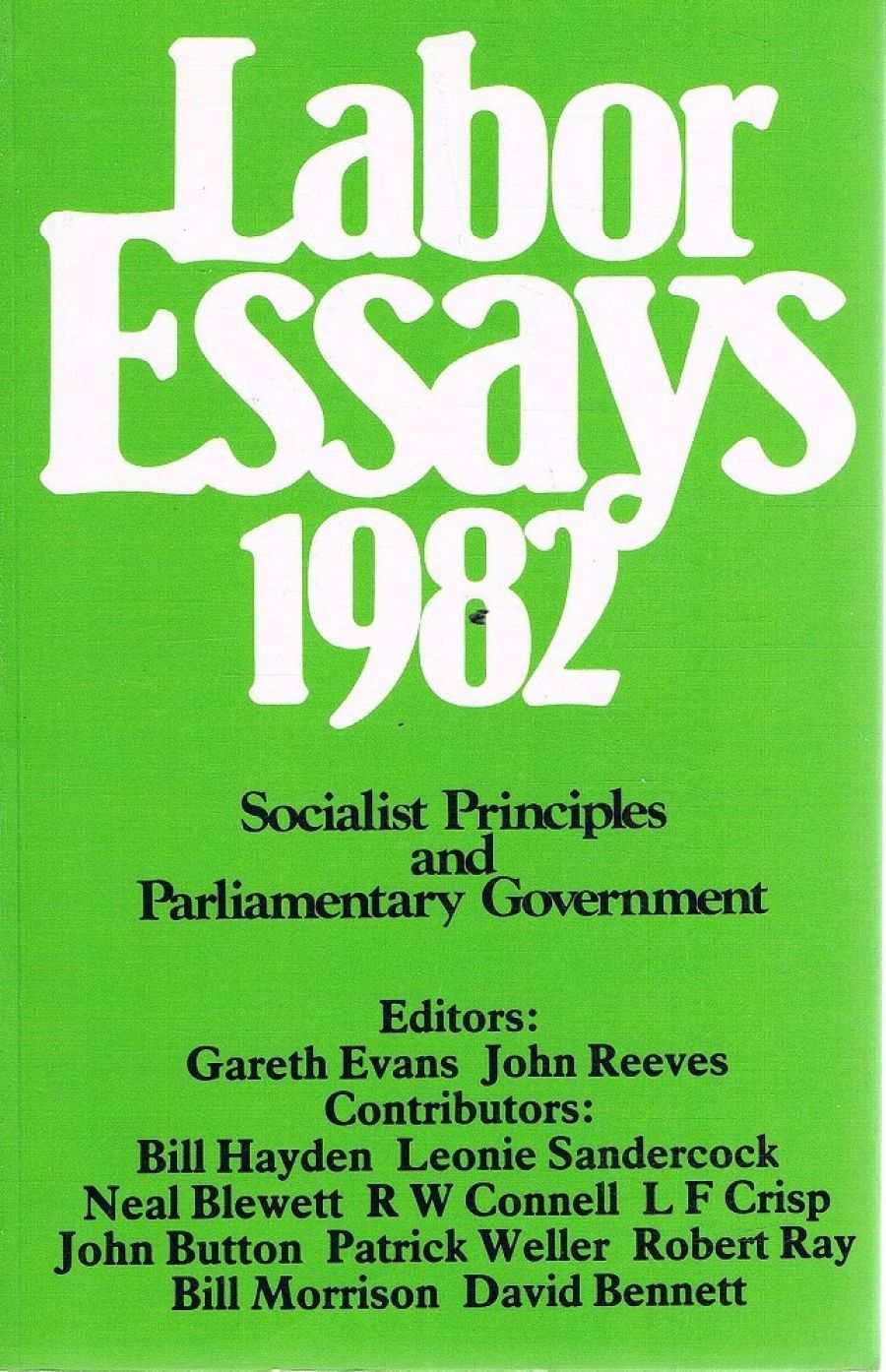
- Free Article: No
- Contents Category: Politics
- Review Article: Yes
- Online Only: No
- Custom Highlight Text:
Times are changing within the Labor party. As L.F. Crisp points out in his essay on the branches, the new membership is often educated middle class and keen to discuss the International Situation where once the thing was to have a few beers and raffle a chook. Even Bill Hayden, despite his cop background, reflects some of the new flavour of the party with his too often carping manner, redolent of the classroom pedant. That Labor Essays – ‘designed to stimulate creative thought within and without the party’ – should have begun to appear in 1980 seems not unrelated to the growing desire within the party for intellectual as well as emotional satisfaction.
- Book 1 Title: Labor Essays 1982
- Book 1 Subtitle: Socialist principles and parliamentary government published on behalf of the Australian Labor Party
- Book 1 Biblio: Drummond Publishing Co,199p, $8.95 pb
Many of the contributors provide useful critiques of the shortcomings of our society. Hayden on the concentration of economic power in Australia, John Button on the failure of Malcolm Fraser’s federalism to live up to its ideas. Neal Blewett on the inconsistencies and hypocrisies of neoconservative ideology, David Bennett’s excellent essay on the failure of the Australian educational system to provide fairness are all worthy pieces of analysis which provide succinct criticisms of the Australian capitalist system.
As for what is to be done, and what ought to be done, the contributors display a variety of attitudes and answers.
The two senior politicians amongst the contributors, Hayden and Button, show the most sobriety amongst a pretty unintoxicated gathering. Thus, Hayden after flailing mightily at the evils of Fraserism, fails to match the level of his ire with equally drastic prescriptions. Instead, while talking about the need for more government activity and planning, he points out that things must proceed slowly, that reform will be a long process, that an active government must be ‘prudently active’.
Equally, Button is not going to terrify anybody with his views on how the federal system ought to work. He resolutely declares that he refuses to succumb to any armchair or Whitlamesque fantasies about how to rearrange the present system into a centralist-regionalist pattern. He declares that Labor will have to learn to live with the states and that intergovernmental relations need to be flexible, sensitive and cooperative. This may presage a new realism within the ALP, from which genuinely creative reform can flow or it may presage a more resigned attitude to the whole bloody mess.
Leonie Sandercock and Blewett, less in the public eye than Hayden or Button, retain bolder imaginations. They see before them still the vision splendid of Scandinavian social democracy – a world of strong government, a controlled private sector and of industrial democracy. Sandercock is willing to take on the myriad of left academics who claim that the welfare state is a capitalist hoax. By reference to Scandinavian. experience she demonstrates that it is not always the case that the welfare state fails to redistribute goods and services. Further, she argues for an Australian variant of the Mieden plan whereby companies are to become progressively owned by the unions. I suppose it is, churlish to note that even the Swedes have not yet adopted this plan, although it is the policy of their newly elected Social Democratic government.
Other essays take less grand subjects. Patrick Weller discusses what Parliament might be, if the executive were to relinquish some of its discipline over the backbench. Bob Connell writes about the need for Labor to take the feminist movement seriously as a strike against competitive and egalitarian values. Without denigrating the worthiness of their ideas, it is difficult to avoid drawing their attention to recent events in the Victorian parliament where the entire group of women parliamentarians seems to have fallen in behind the principle of the rights of male members of caucus to kiss ladies in the Liberal party whether those ladies liked it or not.
Bill Morrison presents a rather self-congratulatory piece on the need for Australia to have a more self-reliant defence policy. Robert Ray attacks proportional representation and provides the thinking numbers man with some information about the best ways for maximising the Labor vote.
As noted earlier, David Bennett’s easy on Australian education is deserving of special attention. His analysis of the state aid policy is refreshingly non-simplistic, including a discussion of the way in which the operation of the federal system has served to perpetuate the lag in standards between the Catholic private schools and the state schools. If he can think of no easy solution to the problem of how to reduce inequality between schools, his critique of the meritocratic assumptions behind our educational policies should help some fundamental rethinking.
It would be easy to dismiss the article by L.F. Crisp on the ‘Labor Party – Then and Now’ as backward-looking, sentimental and unprogressive. In lamenting the disappearance of the blue-collar worker from the party, Crisp goes so far as to oppose affirmative action for women because that will only lead to more middle-classing of the A.L.P. But he does raise a matter which is, very germane to the whole thrust of this book: if a party which professes a belief in class equality fails to practise it in its internal life, how seriously ought we to take it?


Comments powered by CComment